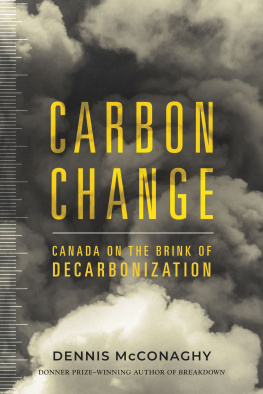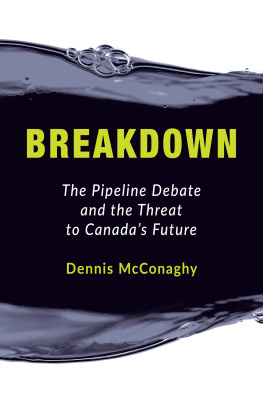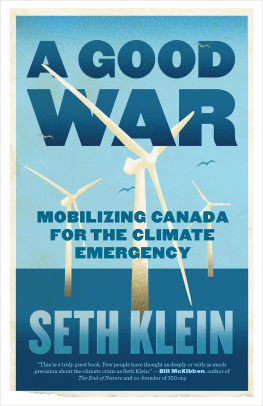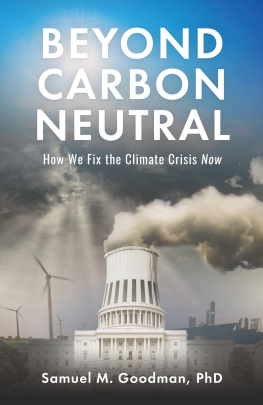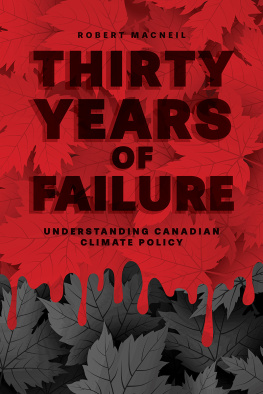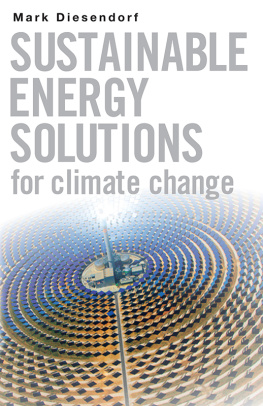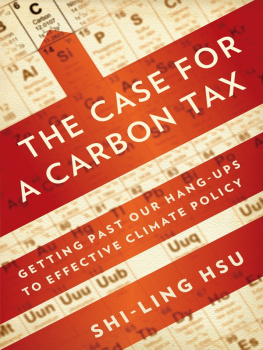Table of Contents
Landmarks
List of Pages
CARBON CHANGE
CARBON CHANGE
CANADA ON THE BRINK OF DECARBONIZATION
DENNIS McCONAGHY

Copyright Dennis McConaghy, 2022
All rights reserved. No part of this publication may be reproduced, stored in a retrieval system, or transmitted in any form or by any means, electronic, mechanical, photocopying, recording, or otherwise (except for brief passages for purpose of review) without the prior permission of Dundurn Press. Permission to photocopy should be requested from Access Copyright.
Publisher: Kwame Scott Fraser | Acquiring editor: Kathryn Lane | Editor: Dominic Farrell
Cover designer: Karen Alexiou
Cover image: Jens Johnsson on Unsplash
Library and Archives Canada Cataloguing in Publication
Title: Carbon change : Canada on the brink of decarbonization / Dennis McConaghy.
Names: McConaghy, Dennis, 1952- author.
Description: Includes index.
Identifiers: Canadiana (print) 20220254974 | Canadiana (ebook) 20220255113 | ISBN 9781459750517 (softcover) | ISBN 9781459750524 (PDF) | ISBN 9781459750531 (EPUB)
Subjects: LCSH: Energy transitionCanada. | LCSH: Energy transitionCanadaCosts. | LCSH: Energy policyCanada. | LCSH: Carbon dioxide mitigationCanada. | LCSH: Carbon dioxide mitigationCanadaCosts. | LCSH: Climate change mitigationCanada.
Classification: LCC HD9502.C32 M2937 2022 | DDC 333.790971dc23

We acknowledge the support of the Canada Council for the Arts and the Ontario Arts Council for our publishing program. We also acknowledge the financial support of the Government of Ontario, through the Ontario Book Publishing Tax Credit and Ontario Creates, and the Government of Canada.
Care has been taken to trace the ownership of copyright material used in this book. The author and the publisher welcome any information enabling them to rectify any references or credits in subsequent editions.
The publisher is not responsible for websites or their content unless they are owned by the publisher.
Printed and bound in Canada.
Dundurn Press
1382 Queen Street East
Toronto, Ontario, Canada M4L 1C9
To children everywhere, in the hope that the possibility of living in a world that can evolve more rationally and safely still exists.
Contents
Introduction
After publishing my first two books, Dysfunction (2017), about the drawn-out demise of the Keystone XL pipeline, and its sequel, Breakdown (2019), about the links between resource development, climate change, Indigenous rights, and Alberta alienation, I did not expect to write a third; it seemed to me that I had substantially contributed all I had to offer. However, since 2019 I have watched the worlds approach to dealing with the risk of climate change moving in a direction that I believe needs reconsidering.
The United Nations process designed to reduce the concentration of greenhouse gases (GHGs) in the atmosphere, established in the early 1990s, has been adopted by virtually every nation. It relies on the findings of an extensive group of scientists and other scholars to assess the physical and economic dimensions of climate change. That process, the only one of its scope, has adopted as orthodoxy that there is an urgent need to radically decarbonize the developed worlds energy systems, with the aim of stabilizing global average temperatures at a level no more than 1.5C above pre-industrial norms. To be clear, to decarbonize means that hydrocarbons could no longer be produced or consumed full stop. The related concept of net-zero emissions leaves open the option of hydrocarbon production and consumption, provided that any related GHG emissions are not released into the atmosphere. This possibility might be currently affordable the claim is debatable in a very few contexts, such as would be found in coal-based electric generation facilities. Beyond that, the current status of the technology is highly challenged economically.
Some proponents of this transformation contend that even with decarbonization, energy will remain as affordable and available as it is today, a situation that will allow our economies to remain virtually unchanged. We could enjoy continued growth and the same living standards, but we would not be adding additional GHGs to the atmosphere. Others who advocate decarbonization make no such claim but contend that no price, even a significant negative impact on human welfare, is too great to reduce emissions.
Climate change risk is real and serious, as is evidenced by its impacts on the worlds oceans, on its forests and farmland, and on biodiversity in every ecosystem, and it is clearly attributable, for the most part, to human activity. There has been a measurable rise in global temperatures since pre-industrial times; by the end of 2021, that increase was on the order of 1C. The United Nations Intergovernmental Panel on Climate Change (IPCC) Sixth Assessment Report from its Working Group 1 states, The frequency and intensity of hot extremes have increased and those of cold extremes have decreased on the global scale from 1950. It concludes that it is an established fact that human-caused emissions of greenhouse gases have led to an increased frequency and/or intensity of some weather and climate extremes.
My passionate belief is that climate change must be addressed globally, but with policies and actions consistent with both our understanding of the physical risk and the costs associated with attempting to lessen that risk and adapting to whatever changes occur as a result of climate change. The world should reconsider decarbonization and focus on an alternative method of dealing with the risk of climate change, one based on adapting to a level of global temperature increase higher than 1.5C, and more likely on the order of 3C.
Of course, for this to occur, the UN process for dealing with climate change would have to be reinvented. Currently, that process allocates emissions reductions to those developed countries that are major emitters, while allowing others, such as China and India, to be free riders, not bearing a proportionate share of the costs of mitigating climate change risk. This is not working. Instead, the process should be predicated on carbon pricing set via carbon taxes on emitted GHGs and applied consistently across the worlds developed economies. Not only would this approach avoid the free rider problem, which is completely ignored in the current approach, but the revenue from carbon taxes could fund adaptation in those countries least culpable for the accumulation of emissions in the atmosphere, historically and currently, and most vulnerable to the impacts of climate change. Carbon pricing would be constrained by the social cost of carbon, that is, the net cost arising from climate change, accounting for the benefits of continued hydrocarbon consumption and higher GHG concentrations in the atmosphere. A cost/benefit analysis approach would create a more economically optimal outcome for managing the climate change risk than unconditional adherence to decarbonization.
Since my last book was published in 2019, the world has been profoundly impacted by the advent of the Covid-19 pandemic. The worlds reaction to it offers, according to many, an example of how we ought to react to the risk of climate change, most notably strict compliance with government interventions, regardless of the economic consequences. Climate change and the Covid-19 pandemic have in common the fact that they are global in scope. However, I take issue with the proposition that Covid-19 and climate change both pose immediate existential risks to humanity, if by that we mean a situation in which humanity faces imminent extinction, and therefore ought to be addressed with similarly extreme measures.

